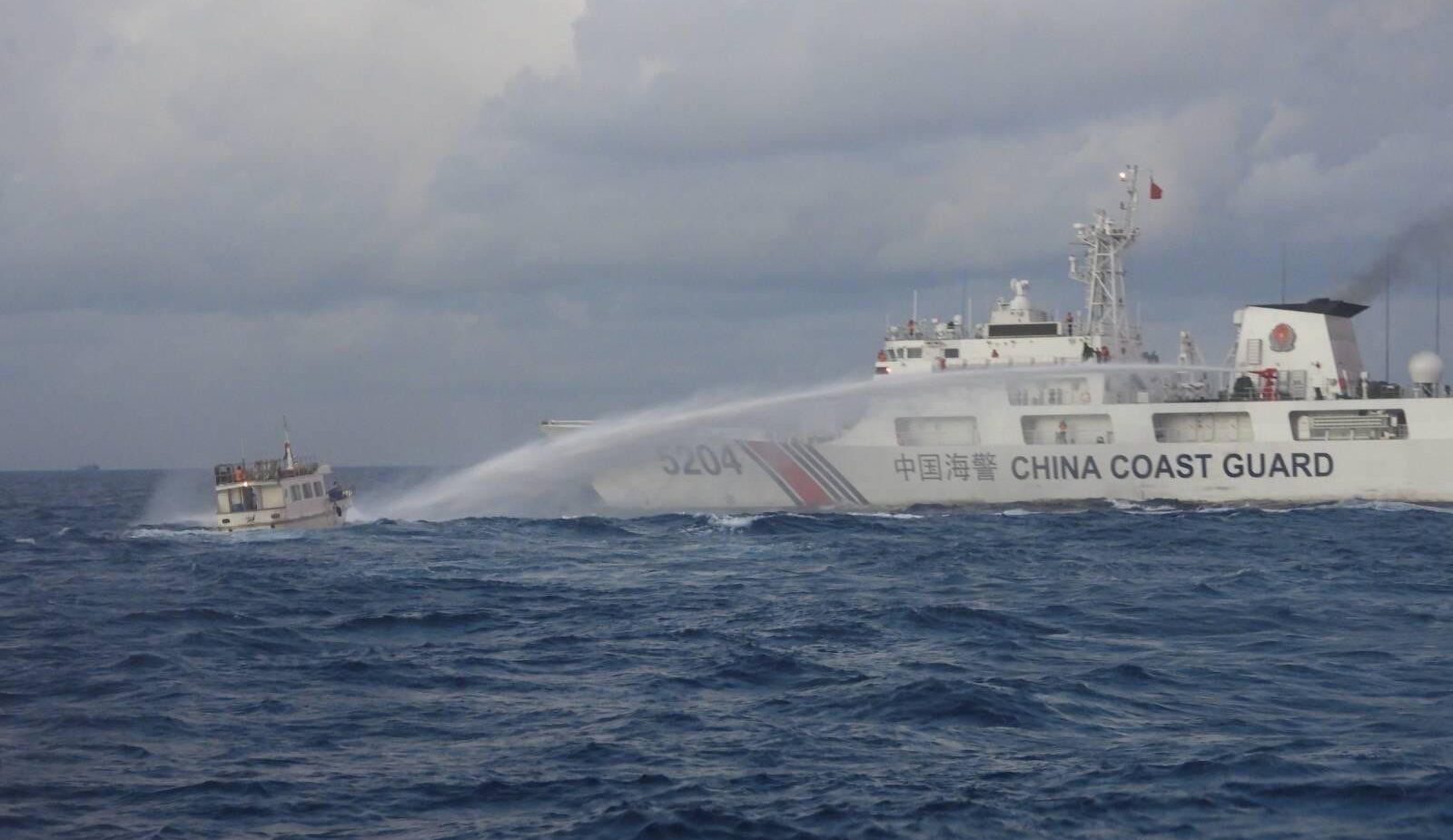
A Chinese military vessel fires water cannon at Philippine boat M/L Kalayaan during a resupply mission in Ayungin (Second Thomas) Shoal in the West Philippine Sea on Dec. 10, 2023. (Photo courtesy of PCG)
MANILA, Philippines –The Philippine government is ready to protect its fishermen from Chinese detention threats in the West Philippine Sea by bolstering maritime resources, Zambales Rep. Jefferson Khonghun said on Friday.
“Our government, led by President Ferdinand ‘Bongbong’ Marcos, and of course our Speaker, Speaker Martin Romualdez, will do everything in their power to protect our fishermen from the threat of detention by China, especially as June 15 approaches,” Khonghun stated during a press conference following a House committee hearing on national defense, security, and the West Philippine Sea.
China has approved new regulations authorizing its coast guard to detain foreign “trespassers” for up to 60 days without trial if they cross what Beijing claims are its borders.
READ: US concerned over West Philippine Sea; aid hike eyed
This comes amid increasing regional tensions. In recent months, Philippine Coast Guard (PCG) vessels have been involved in several collisions with Chinese coast guard ships around disputed reefs in the South China Sea, which Beijing claims almost entirely.
Additionally, PCG boats have been fired upon with water cannons by the China Coast Guard, with the latest incident occurring on April 30 near the China-controlled Scarborough Shoal.
The Scarborough Shoal, a triangular chain of reefs and rocks, lies 240 kilometers west of the Philippines’ main island of Luzon and nearly 900 kilometers from Hainan, the nearest major Chinese landmass.
Khonghun outlined plans to lodge diplomatic protests against China’s illegal actions and secure funding for additional vessels for the PCG and the Philippine Navy in the next national budget. He underscored the importance of maintaining the Philippines’ territorial integrity and sovereignty.
“We must defend our sovereignty and territory. Our President has made it clear that he will not allow any inch of our territory to be taken by foreigners. We will not surrender any territory to China,” he said.
Sta. Rosa City Rep. Dan Fernandez advised fishermen to fish in groups as it may deter China from detaining them because there is strength in numbers.
“My advice to our fishermen is to fish together. You know, if they are consolidated, it will serve as a greater deterrent against the enforcement of fishing bans on our fishermen here,” Fernandez said.
“I believe that together we will have a form of strength that we can show to our Chinese counterparts,” he added.
Leyte Rep. Richard Gomez encouraged the government to continue bilateral talks with China to prevent the latter from detaining Filipino fishermen.
“We will have to encourage continued bilateral talks, especially with these kinds of threats happening within the next few weeks,” Gomez said.
The Philippines’ efforts to counter China’s assertiveness are also supported by international alliances. Japan, a former occupier of the Philippines during World War II, has grown closer to Manila through trade, investment, and shared concerns over regional security.
The two nations are negotiating a defense pact to allow troop deployments on each other’s territory, further deepening their security cooperation.
Last month, leaders from Japan and the Philippines, both longtime allies of the United States, met with U.S. President Joe Biden in Washington for a trilateral summit focused on regional stability.
Tensions over the West Philippine Sea, coupled with saber-rattling over China’s claims to the self-governing island of Taiwan, have prompted Biden to reinforce alliances in the region.
Despite an international ruling that China’s expansive claims have no legal basis, Beijing continues to assert control over most of the waterway, disregarding rival claims from other countries, including the Philippines.

